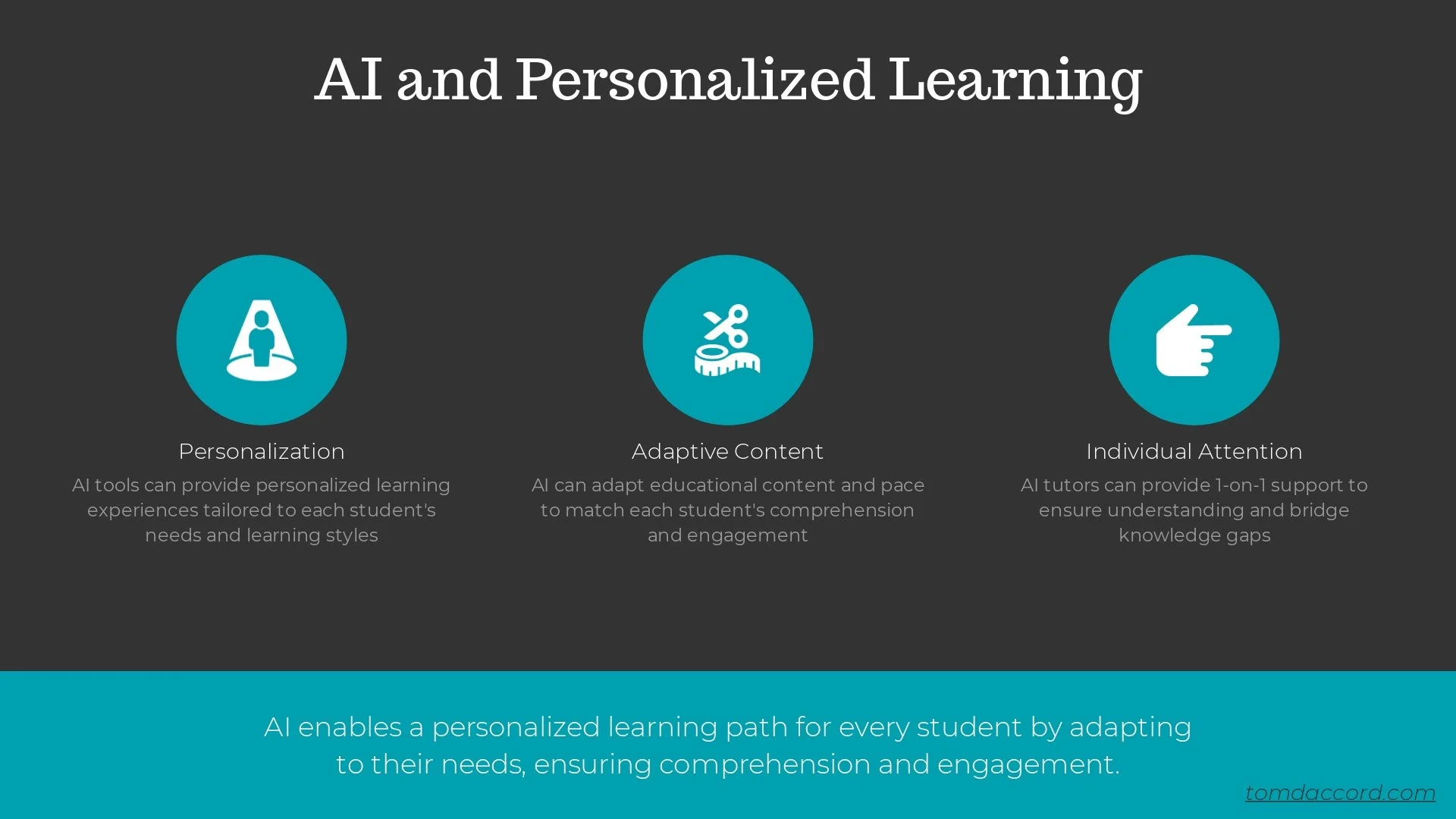
Tom Daccord
10,000+ Teachers Trained. 15 Years of Global Leadership. Let’s Transform Your AI Journey.
Work With Tom: Onsite & Online
-

Keynote Presentations
One-hour keynote presentation on AI in education — onsite or online — designed for larger groups, such as school faculty and administrators or college instructors.
-

Keynote + Sessions
One-hour featured keynote presentation on AI in education designed for larger groups, plus additional smaller-group sessions — onsite or online
-

Small Group Sessions
Online or hybrid programs designed for small groups, such as department-level teachers, grade-level teachers, and school edtech specialists.
AI for Personalized Learning
What is Personalized Learning?
Personalized learning is an educational approach that aims to customize the learning experience for each student based on their individual strengths, needs, interests, and goals. Personalized learning can help students achieve superior outcomes, boost engagement, and develop lifelong learning skills. However, implementing personalized learning poses many challenges for teachers, such as creating differentiated instruction, evaluating student progress, offering timely feedback, and overseeing diverse classrooms.
How AI Can Support Personalized Learning
AI can support personalized learning for K-12 students by equipping them with adaptive and intelligent tools that can enhance their learning process and outcomes. AI can also help teachers by automating certain tasks, providing them with data and insights, and enabling their professional development.
5 AI Strategies for Personalized K-12 Learning
Intelligent Tutoring Systems (ITS)
Intelligent Tutoring Systems are an effective means to personalize learning for students as they can emulate one-on-one tutoring by providing students with guidance, hints, explanations, and feedback on their work. ITS uses machine learning to analyze the data generated by learners and provide them with customized feedback, guidance, and support. In this manner, Intelligent Learning Systems can personalize the learning experience by fashioning a dynamic learning environment that captures individual characteristics, preferences, goals, and progress. ITS can enhance the outcomes, engagement, and motivation of students by providing them with relevant, challenging, and meaningful learning activities.
One example of an an Intelligent Learning System is Khanmigo. Khanmigo is an experimental AI guide developed by Khan Academy, a nonprofit educational organization that offers free online courses and videos on various topics. Khanmigo is designed to provide students with one-on-one tutoring by leveraging AI techniques, such as natural language understanding, speech recognition, and computer vision. Khanmigo can interact with students through voice or text, understand their questions and needs, provide them with relevant content and exercises, and give them feedback and encouragement. Khanmigo can also help teachers by providing them with AI-guided lesson planning and insightful student feedback.
In addition, Knewton is an adaptive learning platform that uses AI to personalize educational content and assessments based on each student's performance and learning style. It can identify knowledge gaps and provide targeted recommendations to help students master concepts more efficiently.
2. Adaptive Learning Systems
Adaptive learning systems can help personalize learning because they can adjust educational content in real-time based on a student's performance, ensuring that the material presented is always at the right level of difficulty. This personalization keeps students engaged, challenged, and supported throughout their learning journey, resulting in better retention and understanding. . Adaptive learning systems can improve the outcomes, efficiency, and satisfaction of students by providing them with relevant, challenging, and feedback-rich learning activities.
One example of an a Adaptive Learning Systems is DreamBox. DreamBox is an adaptive mathematics platform designed for K-8 learners. It uses an intelligent adaptive algorithm to help students learn math concepts at their own pace, by adapting the content to their individual learning needs. Dreambox covers the Common Core State Standards and other standards for math curriculum.
Lexia Core5 Reading is an adaptive literacy program for pre-K–5 students. It uses AI to assess students' reading skills and provide personalized learning paths that adapt to their progress. The program focuses on key reading skills like phonological awareness, phonics, fluency, vocabulary, and comprehension.
3. AI for Roleplaying
Roleplaying in learning allows students to immerse themselves in scenarios, and practice decision-making and problem-solving skills. When enhanced with AI, these scenarios can adapt to individual student choices, providing a unique and personalized learning experience each time.
Roleplaying is a creative and interactive way of learning that allows students to immerse themselves in different scenarios, characters, and perspectives. Roleplaying can enhance students’ communication, collaboration, empathy, and problem-solving skills. AI can support roleplaying by generating realistic and engaging stories, dialogues, and feedback that adapt to the students’ choices and actions.
Some AI tools for roleplaying are:
ChatGPT. ChatGPT can be used for role-playing in a variety of ways. For example, ChatGPT can generate scenarios that involve math or science concepts, such as measuring ingredients for a recipe, conducting a science experiment, or solving a real-world math problem. ChatGPT can also generate scenarios that involve real-life situations that students might encounter when communicating in a foreign language.
Hello History: Social studies teachers can use ChatGPT to create historical role-playing activities for their students. Hello History is a fun and unique opportunity to talk to 400+ historical figures. Characters are grouped by historical category, such as “Middle Ages” or “Founding Fathers of USA”. Students can ask questions directly to these AI-powered characters, receiving responses that reflect the historical figure's known beliefs, speeches, and writings.
CharacterAI: CharacterAI features AI characters that can simulate conversations, behaviors, and personalities. It enables the creation of a wide range of characters, from historical figures to fictional personas.
4. AI for Educational Games
Educational games make learning engaging and fun. When powered by AI, these games can adapt to a student's skill level, ensuring that challenges are neither too easy nor too hard. This keeps students motivated and reinforces learning through play.
Educational games are fun and interactive ways of learning that can motivate students, enhance their retention, and reinforce their knowledge. Educational games can also provide immediate feedback, personalized challenges, and adaptive learning paths. AI can support educational games by creating dynamic and immersive game worlds, generating adaptive content and feedback, and analyzing student performance and behavior.
Some AI-infused tools for educational games are:
Minecraft. In Minecraft Education is an engaging educational platform that offers 500+ lesson plans to engage students in game-based learning across the curriculum. Students can explore historical recreations, engage in collaborative building projects, work on problem-solving topics, and more.
iCivics is a non-profit organization that provides free, interactive educational games and resources designed to promote civic engagement and understanding among K-12 students. Developed in collaboration with educators and game designers, iCivics' AI-powered games and simulations allow students to experience the workings of government, the electoral process, and the challenges of civic participation in a fun, engaging manner.
Drops. Drops, a member of the Kahoot! family, is a colorful and lively app that focuses mainly on teaching vocabulary. Like its inspiration, Kahoot!, Drops is game-based and has a minimalistic design.
5. AI for Quizzes and Flashcards
Quizzes and flashcards are effective and efficient ways of learning that can help students review, recall, and apply their knowledge. Quizzes and flashcards can also improve students’ metacognition, confidence, and test-taking skills. AI can support quizzes and flashcards by creating smart questions, providing feedback, and optimizing the spacing and timing of reviews.
Flashcards can be used in different types of learning activities and modes to help students learn, memorize, and master content. uses AI to determine which flashcards a student should study based on their past performance.
Some AI-infused quiz and flashcard tools are:
Quizlet. With Quizlet, teachers and students can create their own flashcard sets or select from the millions of sets created by other users.
Quizgecko. Quizgecko is an AI-driven tools that swiftly transforms any text into quiz questions, flashcards, and notes. With Quizgecko, teachers can craft a variety of question styles, including multiple-choice, true or false, short essay answers, and fill-in-the-blanks. They can also upload documents in formats like PDFs, DOCs, and PPTs to curate quizzes.
Additional AI-powered tools can further enhance the personalized learning experience for students by providing targeted support, adapting to individual needs, and offering valuable data insights for teachers to inform their instructional strategies. Look under the “AI Tools for Teachers” of this website for dozens of recommended AI tools.


